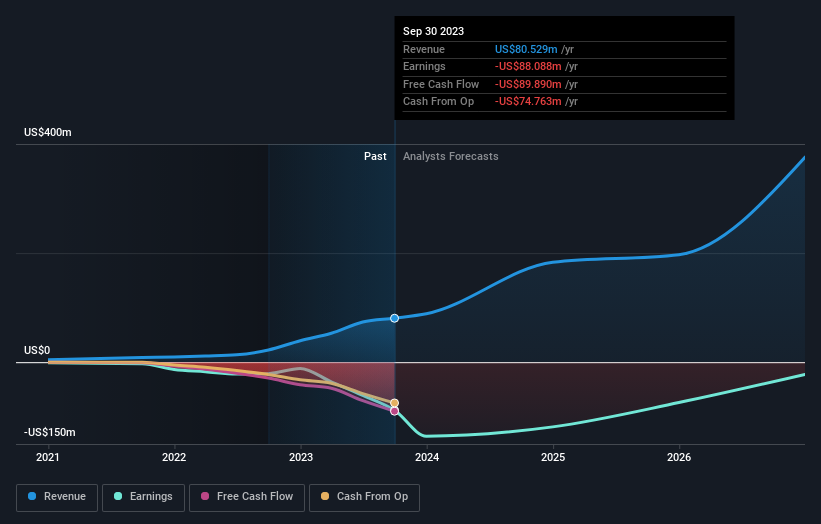Despite selling recently, Rumble Inc. (NASDAQ:RUM) insiders own 71% stake and recent decline might have cost them
Key Insights
Rumble's significant insider ownership suggests inherent interests in company's expansion
The top 2 shareholders own 55% of the company
If you want to know who really controls Rumble Inc. (NASDAQ:RUM), then you'll have to look at the makeup of its share registry. We can see that individual insiders own the lion's share in the company with 71% ownership. In other words, the group stands to gain the most (or lose the most) from their investment into the company.
Despite selling some shares recently, insiders control a good portion of the company's stock. As a result, they were also the group to endure the biggest losses as the stock fell by 4.7%.
In the chart below, we zoom in on the different ownership groups of Rumble.
See our latest analysis for Rumble
What Does The Institutional Ownership Tell Us About Rumble?
Many institutions measure their performance against an index that approximates the local market. So they usually pay more attention to companies that are included in major indices.
We can see that Rumble does have institutional investors; and they hold a good portion of the company's stock. This can indicate that the company has a certain degree of credibility in the investment community. However, it is best to be wary of relying on the supposed validation that comes with institutional investors. They too, get it wrong sometimes. It is not uncommon to see a big share price drop if two large institutional investors try to sell out of a stock at the same time. So it is worth checking the past earnings trajectory of Rumble, (below). Of course, keep in mind that there are other factors to consider, too.
Rumble is not owned by hedge funds. The company's CEO Christopher Pavlovski is the largest shareholder with 37% of shares outstanding. With 17% and 5.8% of the shares outstanding respectively, Ryan Milnes and Daniel Bongino are the second and third largest shareholders.
A more detailed study of the shareholder registry showed us that 2 of the top shareholders have a considerable amount of ownership in the company, via their 55% stake.
While studying institutional ownership for a company can add value to your research, it is also a good practice to research analyst recommendations to get a deeper understand of a stock's expected performance. There is some analyst coverage of the stock, but it could still become more well known, with time.
Insider Ownership Of Rumble
The definition of company insiders can be subjective and does vary between jurisdictions. Our data reflects individual insiders, capturing board members at the very least. Management ultimately answers to the board. However, it is not uncommon for managers to be executive board members, especially if they are a founder or the CEO.
Most consider insider ownership a positive because it can indicate the board is well aligned with other shareholders. However, on some occasions too much power is concentrated within this group.
Our information suggests that insiders own more than half of Rumble Inc.. This gives them effective control of the company. Given it has a market cap of US$2.1b, that means insiders have a whopping US$1.5b worth of shares in their own names. Most would argue this is a positive, showing strong alignment with shareholders. You can click here to see if they have been selling down their stake.
General Public Ownership
The general public-- including retail investors -- own 20% stake in the company, and hence can't easily be ignored. This size of ownership, while considerable, may not be enough to change company policy if the decision is not in sync with other large shareholders.
Next Steps:
While it is well worth considering the different groups that own a company, there are other factors that are even more important. For instance, we've identified 3 warning signs for Rumble (1 is a bit concerning) that you should be aware of.
If you are like me, you may want to think about whether this company will grow or shrink. Luckily, you can check this free report showing analyst forecasts for its future.
NB: Figures in this article are calculated using data from the last twelve months, which refer to the 12-month period ending on the last date of the month the financial statement is dated. This may not be consistent with full year annual report figures.
Have feedback on this article? Concerned about the content? Get in touch with us directly. Alternatively, email editorial-team (at) simplywallst.com.
This article by Simply Wall St is general in nature. We provide commentary based on historical data and analyst forecasts only using an unbiased methodology and our articles are not intended to be financial advice. It does not constitute a recommendation to buy or sell any stock, and does not take account of your objectives, or your financial situation. We aim to bring you long-term focused analysis driven by fundamental data. Note that our analysis may not factor in the latest price-sensitive company announcements or qualitative material. Simply Wall St has no position in any stocks mentioned.

 Yahoo Finance
Yahoo Finance 

